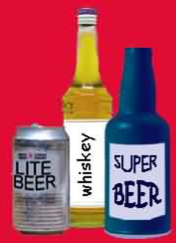What is alcohol?
|
 |
What does alcohol do to your body?
- It slows the function of the Central Nervous System- Slowing down reaction time.
- It alters a person’s perceptions, emotions, movements, vision and hearing.
What are the risk factors of excessive drinking?
- Environmental factors, e.g. :
- Easily available.
- Not too expensive.
- Advertised attractively on media – Usually associated with fun and status.
- Social factors :
- Peer influence.
- Family background.
- Influence by idol and perceived role models.
- Culture.
- Biological factors :
- Genetics.
- Personality (e.g. impulsive, excitable person).
Myths and realities of alcohol use
| Myths | Realities |
|---|---|
|
|
|
|
|
|
|
|
|
|
|
|
What are the effects of alcohol?
The social effects are :
- Reduced concentration and do poorly in studies.
- School absenteeism, affecting academic performance.
- Delinquent behaviour.
- Involvement in crime to support drinking habit.
The physical effects are :
- Intoxication (a person may stagger, have slurred speech, be confused and disorientated).
- Poisoning (the symptoms include extreme sleepiness, unconsciousness, difficulty in breathing, extremely low blood sugar, seizures and even death).
Health is also affected :
- Permanent damage to the brain.
- Liver diseases (hepatitis, cirrhosis, cancer).
- Heart disease (increased blood pressure, strokes).
- Gastric ulceration.
- Intestinal cancer.
- Reduced sex drive and impotence.
- Spontaneous abortion.
- Abnormal babies.
- Anaemia (low haemoglobin level).
Psychosocial problems may also arise:
- Reduced mental functioning.
- Personality changes.
- Aggressive behaviour.
- Depression.
- Suicide.
- Memory disruptions.
What are the indirect health risks?
Alcoholics (a person who drinks alcoholic substances habitually and to excess or who suffers from alcoholism) are prone to:
- Risky behaviors.
- Practise unsafe sex (high risk for HIV / AIDS).
- Display violent behaviour.
- Suffer injuries, for example motor vehicle accidents.
- Making a fool of themselves
What is alcoholism?
Alcoholism is a state of alcohol addiction as a result of alcohol abuse.
When does one suspect a person has alcohol addiction?
- A strong craving to drink.
- An inability to stop drinking.
- Physical dependence (shaking, sweating, nausea).
- The need to increase the amount of alcohol.
- Continued drinking despite difficulties caused by alcohol.
- Speaks highly of alcohol consumption.
How can you stay off alcohol?
You should:
- Practise a healthy life style.
- Know how to :
- Stay away from friends who drink alcohol.
- Keep busy – Take up sports, start an exercise program or hobby, participate in beneficial social activities (e.g. Prostar, Rakan Muda).
- Never give in, not even to a single offer of alcohol – Say “no”.
- Stay away from places that encourage you to take alcoholic drinks like bars, lounges and discos.
- Develop good coping skills (for details see Problem solving).
What can you do if you have a drinking problem?
- Get help as soon as possible.
- Talk to an adult you can trust (parents, doctors, school counselors, etc) or a supportive person.
| Last Reviewed | : | 27 April 2012 |
| Content Writer | : | Dr. Nor Saleha bt. Ibrahim Tamin |
| : | Prof. Madya Dr. Foong Kin | |
| : | Prof. Madya Dr. Alvin Ng Lai Oon | |
| Reviewer | : | Dr. Salmiah bt. Md. Sharif |
| : | Dr. Wan Fadhilah br. Wan Ismail |







